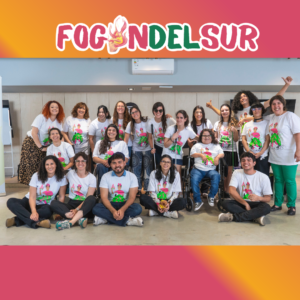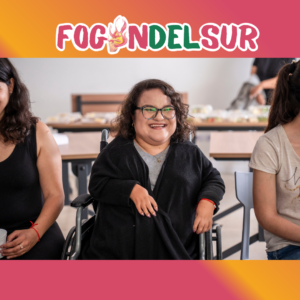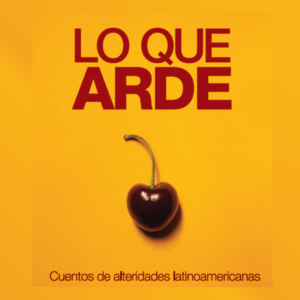Five of META’s active participants from Argentina, Costa Rica and United States participated of the Women Enabled International Convening for advocates on the Rights of Women and Girls with Disabilities, which took place in San Jose, Costa Rica, from July 18-21.
Introducing the AccountaBILITY Toolkit
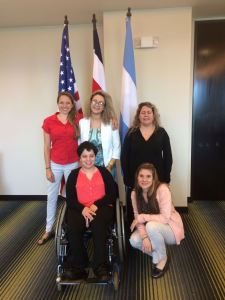 The first day of the Convening welcomed women from all over Latin America who represented various disability groups, races and indigenous groups. Learning goals were set for the week and the WEI accountABILITY Toolkit was introduced as a tool to use UN human rights mechanisms in order to advance the rights of women and girls with disabilities, both locally and nationally,.
The first day of the Convening welcomed women from all over Latin America who represented various disability groups, races and indigenous groups. Learning goals were set for the week and the WEI accountABILITY Toolkit was introduced as a tool to use UN human rights mechanisms in order to advance the rights of women and girls with disabilities, both locally and nationally,.
Working with a Case Study
The second day of the WEI Convening used a sexual and reproductive health and rights case study to guide participants in developing their own proposed advocacy strategies.
The session finished early, giving META the opportunity for community outreach. They traveled to the Jade Museum and met there with a local leader of the popular education movement, Luis Sanabria, to present META, learn more about his group’s publications and development approach, with the objective of possible future collaborations. Sanabria’s response was very positive. After they parted ways the META participants visited the craft market to find Costa Rican treasures to bring home.
Shadow report
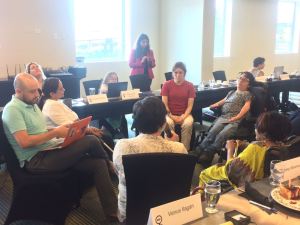 A longer but more interactive session was achieved the third day with a shadow report writing exercise in which participants divided into groups based on their countries (Argentina, Peru, Dominican Republic, United States, Costa Rica and Mexico).
A longer but more interactive session was achieved the third day with a shadow report writing exercise in which participants divided into groups based on their countries (Argentina, Peru, Dominican Republic, United States, Costa Rica and Mexico).
The groups outlined written submissions to a U.N. Human rights body around a hypothetical gender-based violence issue. The group activity was followed by a participant driven agenda that allowed the participants to decide collectively on a series of topics they wanted to discuss in an open forum in order to create an exchange of ideas and best practices, advancing the rights of women with disabilities in the region. Topics included an emphasis on involving youth participation and awareness in said advancement, during which META shared several recent projects and distributed materials to the group.
Each participant offered a question or comment about best practices they could contribute as well as what they were seeking to learn from the group of activists. Carolina Buceta, from META Argentina shared her experience working with REDI, an organization that was invited to a consultation of civil society for the support of creating effective legislation around sexual and reproductive health. Hailey Fox of the U.S. solicited recommended practices for successfully integrating distinct disability groups in collective initiatives.
Planning for Action: The last day of the WEI Convening in San Jose
 As a homework assignment for Thursday, all participants had to develop a two-minute «pitch» to a potential funder or UN treaty body. They were given that short time frame to sit with Stepanie Otroleva, the president and founder of WEI, and «sell» a project goal of their organization.
As a homework assignment for Thursday, all participants had to develop a two-minute «pitch» to a potential funder or UN treaty body. They were given that short time frame to sit with Stepanie Otroleva, the president and founder of WEI, and «sell» a project goal of their organization.
Afterwards, the group discussed opportunities and challenges of working with mainstream women’s rights organizations and steps for building successful collaborative relationships. Strategies for follow-up and implementation were outlined on posters around the room. Andrea Parra requested three volunteers who were willing to form a coalition for the construction of a platform for the Convening attendants. The volunteers included two META members, Daniela Gordon and Brigida Lanzilloto, along with a Chilean representative for visual disability advocacy.
After the meeting adjourned META went to the hotel hot tub and filmed interviews with two of the meeting’s protagonists, Bubulina Moreno and Andrea Parra, both of Colombia.
META workshop
 Following a busy week at the WEI Convening, the META participants took one more day to offer a workshop to young people in Costa Rica. The workshop took place at the University of Sta. Paula and was co-facilitated by Daniela, Mariana, Carolina, Bri, Hailey and one of their male counterparts, Roison Ali.
Following a busy week at the WEI Convening, the META participants took one more day to offer a workshop to young people in Costa Rica. The workshop took place at the University of Sta. Paula and was co-facilitated by Daniela, Mariana, Carolina, Bri, Hailey and one of their male counterparts, Roison Ali.
Attendants included long-time META members along with new recruits that included physical therapy students and members of MORPHO, one of META’s partner organizations based in Perez de Leon, Costa Rica.
A moment was taken at the beginning of the workshop to honor Luis Hernan Cambronero, the founder of MORPHO and one of the original META members. Luis Hernan passed on earlier this year, leaving a legacy behind on the advocacy for independent living of persons with disabilities.
The workshop addressed the intersection of disability and gender and reviewed strategies to combat multiple forms of discrimination identified by the young people. META share a series of videos and past materials produced, including Decimelo a Mi, involving sexual education materials made to be inclusive of sign language. Attendants responded positively with several questions and ideas for how to apply the concepts addressed to their respective realities and work. All were given access to META’s online resources and encouraged to attend future workshops.

